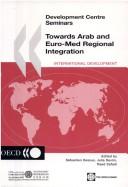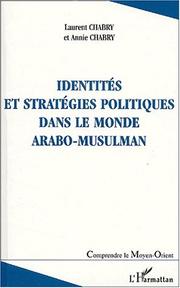| Listing 1 - 2 of 2 |
Sort by
|

ISBN: 9264196889 9789264196070 9789264196889 9786610031047 1280031042 9264196072 Year: 2001 Publisher: Paris : OECD Publishing,
Abstract | Keywords | Export | Availability | Bookmark
 Loading...
Loading...Choose an application
- Reference Manager
- EndNote
- RefWorks (Direct export to RefWorks)
The path towards Arab and Euro-Mediterranean integration is challenging for all countries involved but the potential long term benefits are substantial. Multilateral trade initiatives which run parallel to "open" regional integration with the European Union and among Arab states can generate higher economic growth by promoting free trade in goods, services and assets between developed and developing countries. However these agreements have profound implications for Arab states in the region raising old and new issues in the political economy of regional co-operation and development. The body of evidence presented suggests that if these regional trade arrangements combined, allow for "deeper" forms of integration, competitiveness and cohesion can improve well beyond the Eastern and Southern borders of the EU. Poverty reduction through economic growth is becoming a more urgent shared objective at this time of crisis and represents another potential long term benefit from deeper Euro-Med and Arab integration. In negotiating free trade agreements the EU must therefore strive to make such agreements as equitable as possible; in implementing them, partner countries must focus reform efforts to ensure their efficacy. Arab and Euro-Mediterranean integration can ideally maximise benefits for all countries involved, in spite of significant legal, institutional and administrative hurdles that will have to be overcome to make such relationships workable. The new issues examined in this book (the dynamics of open regionalism, the expansion of domestic markets from increased FDI and monetary stability, and the optimal mix of regional trade agreements) build on conclusions from previous studies regarding modest gains from shallow integration. Deeper regional agreements can be good for growth and stability in a region which has experienced very little of both in recent years.
Foreign trade policy --- International economic relations --- European Union --- Mediterranean countries --- Arab states --- International economic integration. --- Common markets --- Economic integration, International --- Economic union --- Integration, International economic --- Markets, Common --- Union, Economic --- Arab countries --- Europe --- Mediterranean Region --- Circum-Mediterranean countries --- Mediterranean Area --- Mediterranean Sea Region --- Council of Europe countries --- Eastern Hemisphere --- Eurasia --- Arab world --- Arabic countries --- Arabic-speaking states --- Islamic countries --- Middle East --- Foreign economic relations --- Economic integration.

Abstract | Keywords | Export | Availability | Bookmark
 Loading...
Loading...Choose an application
- Reference Manager
- EndNote
- RefWorks (Direct export to RefWorks)
Ethnicity --- Islam and politics --- Ethnicité --- Islam et politique --- History --- Histoire --- Arab countries --- Etats arabes --- Politics and government --- Politique et gouvernement --- 953 --- 297 --- 321 --- Civilization, Islamic --- -321 --- Islam --- Politics and Islam --- Political science --- Muslim civilization --- Civilization --- Civilization, Arab --- Geschiedenis van het Arabisch schiereiland en de Islamitische wereld --- Islam. Mohammedanisme --- Politieke organisatie. Staten als politieke machten. Regeringsvormen --- Political aspects --- -National characteristics, Arab --- Arab world --- Arabic countries --- Arabic-speaking states --- Islamic countries --- Middle East --- Islamic civilization. --- History. --- 321 Politieke organisatie. Staten als politieke machten. Regeringsvormen --- 953 Geschiedenis van het Arabisch schiereiland en de Islamitische wereld --- Ethnicité --- Islamic civilization --- National characteristics, Arab. --- Politics and government.
| Listing 1 - 2 of 2 |
Sort by
|

 Search
Search Feedback
Feedback About UniCat
About UniCat  Help
Help News
News